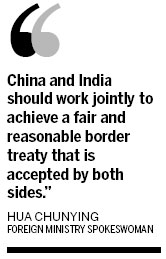China-India border area standoff eases

The two neighbors withdraw troops from camps as close talks continue
Beijing confirmed on Monday that China and India have made positive developments in a three-week border standoff, and called for joint efforts to create a "fair and reasonable" border treaty.
Foreign Ministry spokeswoman Hua Chunying said at a daily news conference that both sides have maintained close contact through border-related channels. The attitude has been cooperative, and the talks are producing positive developments, she said.
India and China simultaneously withdrew troops from camps on Sunday after the two sides reached an agreement during a meeting between border commanders, AFP reported.
Tensions flared between the two neighbors after Indian media claimed that Chinese defense troops "trespassed on Indian territory" in the western sector of the disputed border area in mid-April.
Beijing has disputed the charge, saying that Chinese border defense troops, committed to safeguarding peace and tranquility in the border area, did not cross the Line of Actual Control.
The deadlock continued while both sides have engaged in border talks.
On Monday, the Indian Foreign Ministry confirmed that Foreign Minister Salman Khurshid will come to Beijing as scheduled on Thursday, where he will "discuss bilateral, regional and global issues of concern" with his Chinese counterpart, a spokesman was quoted by AFP as saying.
Premier Li Keqiang will also conduct a planned visit to New Delhi later this month.
Analysts said the incident will not cast a shadow on the general situation of bilateral ties as India and China, fully aware of the importance of friendly relations, will work to resolve differences through established mechanisms.
The peaceful settlement of this crisis is within expectations, as China and India have developed a relatively mature mechanism to respond to such emergencies, said Sun Shihai, an expert on Indian studies at the Chinese Academy of Social Sciences.
Beijing and New Delhi launched a mechanism for consultation and coordination regarding border issues last year. But ties have still been occasionally strained by territorial issues.
Sun said that resolving the border issue will be difficult because the disputed area is large, but maintaining peace and stability in the region conforms to the mutual interest of both countries.
Hua, the Foreign Ministry spokeswoman, said both China and India want to preserve Sino-Indian relations.
"China and India should work jointly to achieve a fair and reasonable border treaty that is accepted by both sides," she said.
Pei Yuanying, a former Chinese ambassador to India, said recently that resolving the Sino-Indian border dispute, an issue left over by history, needs time and patience.
"Border standoffs are somewhat inevitable in the future, but they are only petty issues against the whole backdrop of thriving Sino-Indian relations," Pei said, adding that the point is acknowledged by both sides.
China is India's top trading partner while bilateral trade reached $66.8 billion in 2012.
In late April, Indian Prime Minister Manmohan Singh also downplayed the incident and warned against exacerbating tensions between Beijing and New Delhi.
"We do not want to accentuate the situation," Singh was quoted by AFP as saying.
Pei said that with successful alleviation of standoff this time, it will be easier for the two countries to manage border rows in the future.
AFP contributed to the story.
(China Daily 05/07/2013 page11)














